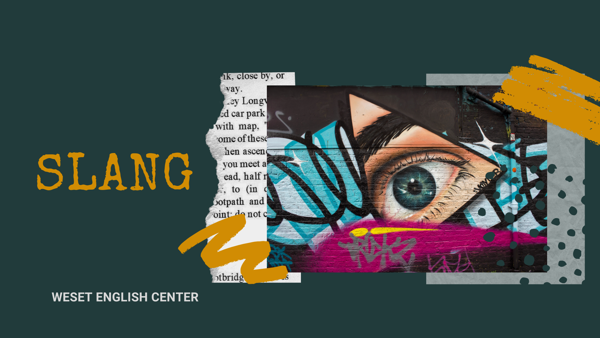Slang là gì? Tổng hợp từ lóng trong tiếng Anh thông dụng & Cách học
- Vân Lam
- Blog học tiếng Anh
- 23/08/2022
MỤC LỤC
Tiếng lóng (slang) là một phần quan trọng của tiếng Anh nói riêng và ngôn ngữ nói chung, được sử dụng bởi mọi người ở mọi lứa tuổi và tầng lớp xã hội. Tìm hiểu về từ lóng không chỉ khiến việc học tiếng Anh trở nên thú vị hơn, mà còn giúp quá trình giao tiếp trở nên tự nhiên và tạo ấn tượng tốt với người bản ngữ.

Slang là gì?
Slang hay từ lóng/ tiếng lóng là thuật ngữ dùng để chỉ những từ/cụm từ/ cách diễn đạt không trang trọng trong văn nói – có ý nghĩa khác biệt so với nghĩa thông thường của chúng. Đặc thù của những từ này là thường được sử dụng khi giao tiếp thân mật, hoặc trong phạm vi một nhóm người/ cộng đồng cụ thể – bao gồm những cá nhân chia sẻ cùng đặc điểm về sở thích, nghề nghiệp, tuổi tác, địa vị xã hội, v.v…
Dưới đây là một số ví dụ về từ lóng (slang) trong tiếng Anh:
- Awesome: tuyệt vời, xuất sắc, đỉnh cao. Ví dụ: You did an awesome job on the project. (Bạn đã làm rất tốt công việc đó.)
- Bae: từ viết tắt của before anyone else, có nghĩa là người yêu, bạn đời. Ví dụ: I love you, bae. (Anh yêu em, người yêu ơi.)
- Chill: thư giãn, bình tĩnh, không lo lắng. Ví dụ: Just chill, everything will be fine. (Cứ thư giãn đi, mọi chuyện sẽ ổn thôi.)
- Cool: ngầu, chất, hay, tốt. Ví dụ: That’s a cool car you have. (Xe của bạn ngầu quá.)
- Crash: ngủ qua đêm ở nhà ai đó mà không có dự định/ kế hoạch trước. Ví dụ: Can I crash at your place tonight? (Tôi có thể ngủ ở nhà bạn được không?)
- Dude: anh chàng, ông bạn, ông anh. Ví dụ: Hey dude, what’s up? (Này anh chàng kia, có chuyện gì vậy?)
- Epic: hùng tráng, phi thường, đáng nhớ. Ví dụ: That was an epic party last night. (Bữa tiệc tối qua thật hoành tráng.)
- Hang out: đi chơi, giải trí cùng bạn bè. Ví dụ: Do you want to hang out with us this weekend? (Bạn có muốn đi chơi cùng chúng tôi vào cuối tuần này không?)
- LOL: từ viết tắt của “laugh out loud”, có nghĩa là cười to, cười phá lên. Ví dụ: That joke was so funny, LOL. (Trò đùa đó quá vui, cười phá lên luôn.)
- OMG: từ viết tắt của “oh my God”, có nghĩa là “ôi chúa ơi/ ôi trời ơi”. Ví dụ: OMG, I can’t believe you won the lottery. (Ôi trời ơi, tôi không tin được bạn có thể trúng xổ số.)
- v.v…
Tầm quan trọng của slang – từ lóng trong tiếng Anh
Slang – từ lóng là một phần không thể thiếu của tiếng Anh, đặc biệt trong giao tiếp hàng ngày. Sử dụng tiếng lóng giúp người nói thể hiện sự gần gũi, thân thiết, hài hước và sáng tạo với người nghe – nhờ đó, cuộc hội thoại trở nên suôn sẻ và thú vị hơn. Đây là cách rất tốt để bạn tạo ấn tượng và xây dựng quan hệ với mọi người.
Bên cạnh đó, slang cũng phần nào phản ánh được đặc trưng của từng nền văn hóa, lịch sử mỗi quốc gia/ vùng miền. Do đó, hiểu biết về tiếng lóng sẽ tạo cơ sở để bạn “thấm nhuần” văn hóa của người bản ngữ, tương tác tự nhiên và hòa nhập tốt hơn vào môi trường của họ.
Dưới đây là một số lý do vì sao bạn nên nghiên cứu về slang trong quá trình học ngoại ngữ:
- Giao tiếp hiệu quả với những người có cùng sở thích, nghề nghiệp, tuổi tác, địa vị xã hội,…
- Hiểu rõ nội dung/ ý tưởng/ hàm ý đối phương muốn truyền tải.
- Tạo ra sự khác biệt với những người khác.
- Thể hiện cá tính cá nhân.
- Cập nhật liên tục kiến thức về ngôn ngữ Anh (vì slang thường thay đổi nhanh chóng/ được cập nhật theo xu hướng mới)
Tuy nhiên, slang cũng có những mặt hạn chế nhất định, như không thích hợp để nói trong các tình huống trang trọng hay môi trường chuyên nghiệp. Ngoài ra, nếu dùng sai cách hoặc không đúng ngữ cảnh, bạn có thể gây hiểu lầm hoặc thậm chí khiến người nghe bị xúc phạm. Vì lý do này, bạn sẽ cần phải học và luyện tập nhiều, đồng thời thường xuyên cập nhật những từ lóng mới theo thời gian.
Vì sao cần nghiên cứu về slang khi học IELTS?
Nghiên cứu về slang khi học IELTS sẽ mang lại những tác dụng như sau:
- Nâng cao khả năng nghe – hiểu và nói tiếng Anh.
- Mở rộng vốn từ vựng – nhờ đó làm tốt phần Listening và Reading hơn.
- Hiểu sâu hơn về văn hóa và con người của các nước nói tiếng Anh.
- Tạo ấn tượng tốt và gần gũi hơn với người bản xứ khi giao tiếp, đặc biệt trong phần thi Speaking.
- v.v…
Tuy nhiên, bạn cũng cần lưu ý rằng slang không phải là một phần chính trong bài thi IELTS. Vì lý do này, bạn chỉ nên nghiên cứu và sử dụng những từ lóng mình thực sự hiểu cách dùng – ở mức độ vừa phải. Lạm dụng slang quá nhiều, không đúng ngữ cảnh – hoặc nói những từ quá thô tục, hàm ý xúc phạm sẽ khiến bạn gây ấn tượng xấu với giám khảo, dễ bị mất điểm không đáng.
Đọc thêm: Từ vựng tiếng Anh giao tiếp theo chủ đề
Tổng hợp các slang (từ lóng) thường gặp trong tiếng Anh

Từ
-
Ace /eɪs/
Xuất phát từ việc quân át (ace) thường là quân cao nhất trong bộ bài (như trong Black Jack chẳng hạn), ace cũng được dùng như một từ lóng (slang) để thể hiện sự xuất sắc và chất lượng tốt. Ý nghĩa của nó là “hoàn thành một việc gì đó cách xuất sắc”.
Ví dụ:
- Congratulations, I heard you aced the test!
(Xin chúc mừng, tôi nghe nói bạn đã đạt thành tích cao trong bài kiểm tra!)
- I aced my physics exam!
(Tôi đã đạt điểm cao trong kỳ thi vật lý!)
-
Diss /dɪs/
Diss là viết tắt của disrespect (thiếu tôn trọng) – nó có nghĩa là xúc phạm hoặc tấn công ai đó. Một “diss track” là một bài hát do một nghệ sĩ sáng tác – chủ yếu nhằm mục đích tấn công bằng lời nói (thường là) một nghệ sĩ khác.
Ví dụ:
- Why are you dissing me?
(Tại sao bạn lại không tôn trọng tôi?)
-
Shade /ʃeɪd/
Đây là một tiếng lóng xuất phát từ thế giới của drag queen – thuật ngữ chỉ những người đàn ông ăn mặc bắt chước và thể hiện những đặc điểm giới tính của phụ nữ. Shade có nghĩa là những lời lăng mạ, vì vậy “to throw shade” có nghĩa là xúc phạm ai đó. Shady có nghĩa chỉ hành động lén lút và đáng nghi ngờ.
Ví dụ:
- My brother’s been throwing me shade for dating his ex.
(Anh trai tôi đã lăng mạ tôi vì hẹn hò với người yêu cũ của anh ấy.)
- That guy’s really shady, don’t come near him.
(Tên đó mờ ám lắm, đừng đến gần hắn.)
-
Props /prɒps/
Prop chính thức có nghĩa là một cái cột hoặc dầm để hỗ trợ hoặc giữ một cái gì đó ở đúng vị trí, nhưng về phương diện slang, nó có nghĩa là ghi nhận công sức của ai đó. Một lưu ý là khi dùng như tiếng lóng, props luôn ở dạng số nhiều.
Ví dụ:
- Props to you! Good job!
(Chúc mừng bạn! Làm tốt lắm!)
- You gotta give him props for his patience, I would have given up a long time ago.
(Bạn phải ghi nhận sự kiên nhẫn của anh ấy, nếu là tôi thì đã bỏ cuộc từ lâu rồi.)
-
Kudos /ˈkjuːdɒs/
Kudos xuất phát từ tiếng Hy Lạp kŷdos, có nghĩa là “khen ngợi”. Lúc đầu nó được sử dụng chủ yếu trong giới học thuật, nhưng dần dần trở nên phổ biến hơn trong giao tiếp.
Ví dụ:
- You got the job? Kudos to you!
(Bạn nhận được việc rồi hả? Chúc mừng bạn!)
- Kudos to everyone who helped organize this party.
(Cảm ơn tất cả những người đã giúp tổ chức bữa tiệc này.)
-
Tea (n.) /tiː/
Tea là thuật ngữ chỉ lời đàm tiếu được trao đổi giữa những người bạn thân – giống như “shade”, nó có nguồn gốc từ văn hóa drag. “Tea” hay “T” là viết tắt của sự thật (truth). Sau đó, nó được sử dụng để chỉ tin đồn, thường xuất hiện theo cụm từ “That’s the tea, sis!” có nghĩa là “Đây là tin đồn chung đang được lưu hành.” “Spill the tea” trà có nghĩa là truyền tin đồn cho người khác.
Ví dụ:
- YOU GOT A MINUTE? I’VE GOT SOME MAJOR TEA TO SPILL.
(Có một phút không? Tôi có một số tin đồn để tiết lộ đây)
- That’s so lame, ugh. Weak tea.
(Ngớ ngẩn! Tin nhạt quá đi.)
Cụm từ/ Thành ngữ
-
Heads up
Heads up = Be careful (Hãy cẩn thận).
Ví dụ:
- Are you going to beach? Heads up for rocks!
(Bạn định đi đến bãi biển hả? Cẩn thận có đá ấy)
-
Beat me
Beat me = I don’t know (Tôi không biết).
Ví dụ:
A: Excuse me, sir! Around here, where can I buy some snacks?
B: Beat me man!
(A: Xin lỗi ông, xung quanh đây có chỗ nào mua đồ ăn vặt không?
B: Tôi không biết đâu bạn ơi!)
-
That sucks
That sucks = That’s bad (Tệ quá)
Ví dụ:
I know, it totally sucks that I have to work on Saturday.
(Tôi biết, thật tệ khi tôi phải làm việc vào thứ Bảy.)
-
What’s up
What’s up = What’s going on (Có chuyện gì vậy/ Ổn không?)
Ví dụ:
I haven’t seen you in a while. What’s up?
(Lâu rồi không gặp bạn. Mọi thứ vẫn ổn chứ?)
-
How do you do?
How do you do => How are you doing? (Dạo này bạn thế nào?)
Ví dụ:
How do you do in life?
(Cuộc sống của bạn dạo này như thế nào?)
Cách học slang – từ lóng trong tiếng Anh
- Xem phim và chương trình truyền hình tiếng Anh
Slang thường được sử dụng trong phim và chương trình truyền hình, vì vậy xem các nội dung này là một cách thức tuyệt vời để tiếp xúc và mở rộng vốn từ lóng. Trong quá trình đó, hãy chú ý đến các từ và cụm từ mà các nhân vật sử dụng và cố gắng tra nghĩa của chúng bằng từ điển ngay khi có thể.
- Nghe nhạc tiếng Anh
Ngoài phim ảnh ra, slang cũng rất hay xuất hiện trong các bài nhạc trẻ hiện đại – do đó, nghe nhạc cũng là một kênh rất hiệu quả để nghiên cứu thêm về tiếng lóng.
- Đọc sách truyện tiếng Anh
Bạn có thể tham khảo đa dạng tài liệu tiếng Anh như sách, báo, video, podcast, v.v… Hãy lựa chọn những tài liệu liên quan đến những chủ đề bạn quan tâm – cũng như cố gắng tra từ điển khi gặp những từ lóng mới.
- Sử dụng từ điển tiếng lóng
Có rất nhiều từ điển tiếng lóng có sẵn trên nền tảng trực tuyến – lấy ví dụ, Urban Dictionary là một lựa chọn rất đáng cân nhắc. Tuy đôi khi không chính xác, trang web giải thích ý nghĩa rất chi tiết – đi kèm ví dụ thực tế, qua đó giúp bạn đọc nhanh chóng nắm bắt và biết cách áp dụng trong giao tiếp thường ngày.
- Giao tiếp với người bản xứ hoặc học viên khác
Bạn có thể tìm kiếm những cộng đồng học tiếng Anh trực tuyến hoặc offline để tham gia vào các hoạt động giao lưu, trò chuyện và học hỏi. Lấy ví dụ, tại WESET English Center hàng tháng đều có tổ chức sự kiện Speaking Club – câu lạc bộ tiếng Anh miễn phí dành cho tất cả mọi đối tượng có nhu cầu nâng cao năng lực giao tiếp và networking.
Khi tương tác với các thành viên trong cộng đồng, bạn nên chú ý lắng nghe và bắt chước cách phát âm và cách dùng từ lóng của họ.
- Viết và sáng tạo nội dung bằng tiếng Anh
Viết nhật ký, blog, bình luận, tweet, v.v… bằng tiếng Anh là cách rất tốt để áp dụng những từ lóng đã học. Việc sáng tạo ra những câu chuyện, bài thơ, bài hát, v.v… có slang sẽ làm cho nội dung của bạn trở nên sinh động và hấp dẫn hơn.
Lời kết
Hy vọng những chia sẻ trên đây của WESET sẽ giúp bạn đọc hiểu hơn về tầm quan trọng của slang – cùng cách học từ lóng trong tiếng Anh để làm cho bài nói/ quá trình giao tiếp trở nên “mượt mà” và thú vị hơn. Đừng quên đăng ký nhận bản tin để cập nhật các tips học tiếng Anh mới nhất – cũng như tham khảo các khóa học theo lộ trình của WESET để chuẩn bị hành trang cho hành trình phát triển năng lực ngoại ngữ của bản thân bạn nhé!
Có thể bạn quan tâm:
- 6 từ điển Anh-Anh online siêu xịn để học từ vựng chuẩn xác
- Connotation là gì? Ứng dụng trong học IELTS & tiếng Anh
- Trọn bộ 7 bộ sách học từ vựng – ngữ pháp – phát âm từ band 1.0 tới band 9.0
- 100 Collocation thường gặp & Hướng dẫn học chi tiết
- Phrasal Verb là gì? Tổng hợp 100 Phrasal Verbs thông dụng





